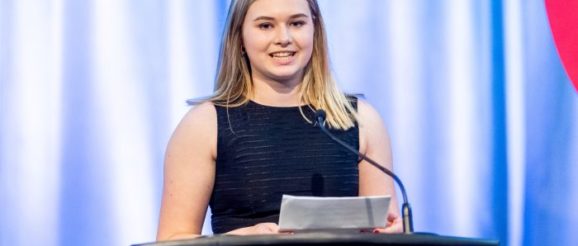Meet the Canadian teens who won the 2019 Weston Youth Innovation Awards – Owl Connected

Last Wednesday, June 26, was a big day in Canadian youth science.
Six teens were hailed for their groundbreaking science and tech projects at the Ontario Science Centre. It was the 2019 Weston Youth Innovation Awards, and that name pretty much sums up what we saw.
The inventive thinking and determination on display was mind-blowing — a reminder that when it comes to changing your world, age doesn’t matter. We cover a lot of science breakthroughs on this website (as you may have noticed). Every one of these finalists showed off projects worthy of the most seasoned scientists.
Let’s check them out!
Grand Prize Winner: Stella Bowles
Stella shows off her Weston Youth Innovation Award. (Courtesy of Ontario Science Centre)
The top prize winner also happened to be the youngest of the finalists — fifteen year-old Stella Bowles from Upper LaHave, NS. Her project combined years of citizen science and environmental activism to draw attention to the pollution in her local river, the LaHave.
After being told as an eleven-year-old that she couldn’t swim in the water behind her home, she set about investigating why. Once her tests proved that untreated sewage was being drained into the river, she started putting pressure on governments to bring about change. Today, not only has her pressure led to the sewer pipes being eliminated, she is also an author and a touring activist who teaches other kids how to test their water and follow her lead.
And her victory also won her $15,000. Wow!
Runner-up: Nicolas Fedrigo
Nicolas talks about why he built his probe — to help his uncle, who was undergoing spinal surgery. That’s a top notch nephew! (Getty Embed)
The runner-up — and winner of $8,000 — was eighteen year-old Nicolas Fedrigo from Victoria, BC. He redesigned a pedicel probe, which is a device used in spinal fusion surgery. This is when a break in spinal bones (or vertebrae) is repaired by bolting the bones together so they can heal.
But this vital surgery comes with high risks, including partial paralysis (the inability to move part of your body) because important nerves are encased within the bones of our spine — one false move can equal disaster. Nicolas’ probe makes it easier for surgeons to repair bones, lowering the risks of ever touching the nerves.
Nicolas is a perfect example of the power of science fairs.
“I started my first science fair project in Grade 9,” he told us, “when my science teacher, Mr. Sean Hayes, inspired me to get involved at the regional [fair]. I ended up winning a placement to go to the national fair. At the time, I didn’t even know what the Canada-Wide Science Fair was!”
Since then, he’s been at dozens, across the country and around the world, winning numerous awards along the way. Clearly, Mr. Hayes’ push paid off!
Three-way tie for third
There were also three third place awards of $3,500 each. They went to:
Congrats to everyone!
INTERVIEW: Stella on powering change
We thought that we’d end by talking with the event’s inspiring winner, Stella Bowles.
OWLconnected: You began working on this project when you were eleven. What got you started?
Stella: When I was eleven, I didn’t understand politics or how [the problem] was going to get fixed. I just wanted to swim in my river. It’s something I think anyone would want to do. That passion in me just kind of came out and asked questions. I encourage everyone to ask questions, because without questions, nothing happens.
OC: When did it go from being a passion to being something that you thought could really change things?
Stella: After I contacted scientists and did the testing, we posted it on Facebook. As soon as I started getting calls from the media and the government, I thought, Oh my, I might actually get to swim in my river some day. Even just saying that gives me goosebumps!
OC: What did people know about this problem before your tests?
Stella: This local non-profit, Coastal Action, they do testing, but no one took action with their results. My mentor, Dr. Maxwell, he had been testing years before me and he’d been screaming that we needed to do something, but no one did anything until a kid [that’s Stella!] came along. I think my age had power in that situation.
OC: So is that a political lesson that you learned — that kids do have big power to change things?
Stella: I found that it took a few months for the politicians to actually contact me. Then within a day, all three levels (local, provincial, federal) texted me. Because if you don’t answer a kid, why aren’t you? But if you do, why did it take a kid?
I think we kind of backed the politicians into a corner without meaning to. I don’t like to say it like this, but this was an accident project, kind of. It was just supposed to be a Grade 6 project, get it over with, move on. But it’s been four years, and it’s incredible!
